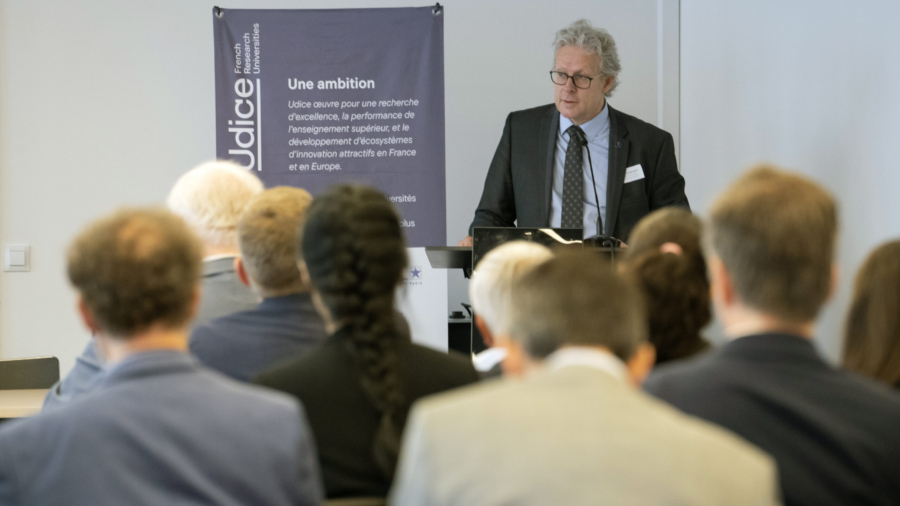The second edition of the Udice International Forum was held on June 7.
Once again this year, the event brought together representatives of Udice members as well as national and international partners to discuss the major challenges of international cooperation.
The first edition held at Aix-Marseille Université in March 2022 was marked by Russia’s invasion of Ukraine a few weeks earlier. The 2023 forum, hosted by Sorbonne Université, aimed to continue the exchanges begun a year earlier, and to share reflections, feedback and recommendations on various aspects of international cooperation.
See Guillaume Fiquet’s welcome speech
Speakers from France, Germany, Scotland, Norway, Ukraine, the Czech Republic and Latvia took part in three round-table discussions on the following topics:
- Scientific diplomacy and research security
Between the risks of interference and the need to collaborate at international level to advance science, universities must implement their strategy autonomously while following government guidelines.
How can we improve dialogue on diplomacy, cooperation and research security between governments and universities? How can we clarify government guidelines for international collaboration? How can we better assess risks in a context of permanent crisis? How can we make better use of the expertise of research universities to understand these risks?
Read the round table summary
Link to the video
- Response to crisis and prospects for reconstruction in Ukraine
In 2022, the emergency response to the Ukrainian crisis demonstrated the adaptability of European universities; it also revealed the limits of our crisis response mechanisms.
What conclusions can be drawn from the reception of Ukrainian refugees in our universities? How can we better prepare for future crises? Were the programs set up to welcome Ukrainian refugees adapted to their needs? As the conflict continues, how can we avoid brain drain and help rebuild Ukraine’s scientific and academic capacity?
Read the round table summary
Link to the video
- European Alliances as vectors of attractiveness and cooperation
After addressing the international geopolitical context and the impact of repeated crises on the higher education and research sectors, this final round table aimed to discuss instruments for strengthening Europe’s competitiveness and international attractiveness.
University Alliances have become a key element in the strategy of universities in Europe. What are the future prospects for these alliances following the first call for projects?
Are alliances the right tool to meet today’s challenges?
How will they be supported? Can alliances become a tool to support European scientific excellence?
Read the round table summary
Link to the video
The discussions helped to define the issues shared by research universities, identify needs and highlight best practices.
To organize this event, Udice drew on its network of contacts with groups of research universities in Europe and beyond: League of European Research Universities (LERU), Guild of European Research Universities, U15 Germany, U15 Canada, Group of Eight Australia.
The Forum’s lessons for Udice :
- French research universities and the ministries in charge of international cooperation and scientific diplomacy share a desire to strengthen dialogue in order to collectively build France’s international scientific offering.
- Continued dialogue between political and academic players on issues of scientific diplomacy and research security, with a strong need for greater recognition of university autonomy.
- The need for universities to be proactive in meeting the challenges of research security, and to work with the authorities to develop operational responses to risks.
- The importance of avoiding a brain drain following the arrival of Ukrainian students and scientists, and of creating the conditions for rebuilding the Ukrainian higher education and research system in the medium term.
- Support for the research and innovation dimension is essential for the sustainability of Alliances involving research-intensive universities.
- The research and innovation strategies implemented by French research universities can be applied on a European scale through the Alliances, helping to make Europe more attractive and competitive.
- The Alliances can also act as a strong vector of European solidarity, particularly towards Ukrainian establishments.
Michel Deneken, President of Udice, closed the day’s proceedings by focusing on the values shared by research universities in his final remarks. The current geopolitical context calls for a reinterpretation of these values, which are deeply rooted in Europe (democracy, human rights, free movement of people, goods and ideas), in order to remain faithful to them. He also stressed the importance of university autonomy, as illustrated by the European Alliances.

